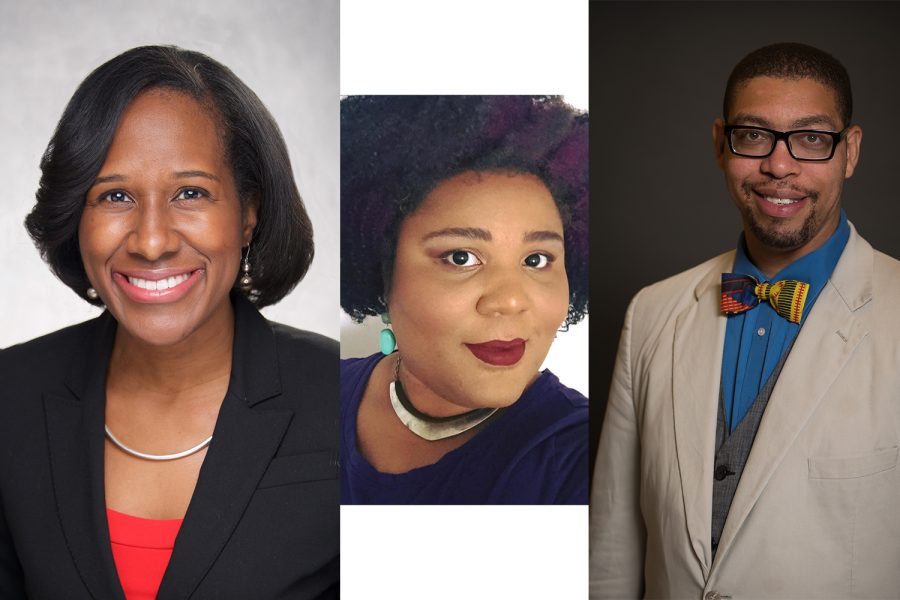Black researchers at the University of Iowa named to inspiring-scientists list
Researchers at the UI Carver College of Medicine are listed among 100 inspiring Black scientists for efforts and achievements in their fields.
From left to right, Nicole Del Castillo, director of the Office of Diversity Equity and Inclusion in the Carver College of Medicine, and UI postdoctoral research scholars, Andrea Marshall and Antentor Hinton, pose for portraits. Contributed.
July 19, 2020
Amid calls for change sparked by the Black Lives Matter movement, researchers at the University of Iowa Carver College of Medicine said it is important to recognize efforts and achievements of BIPOC in science and medicine to encourage diversity and inclusion within the fields.
UI Postdoctoral Research Scholar Antentor Hinton recently published a list of 100 inspiring Black scientists from across the country, including two researchers from the UI Carver College of Medicine, Andrea Marshall and Calvin Carter.
Hinton said it is a three-part series, with one consisting of 100 Latinx scientists for Hispanic Heritage Month beginning in September, and the other featuring 1,000 Black researchers in October, to honor a total of 1,200 researchers.
He said researchers were selected based upon their publication history, honors and awards, how they instruct others, how they represent themselves on social media, and whether they are involved in diversity-focused initiatives.
“It is not random that many Iowans made the lists,” Hinton said. “It is about the caliber of individuals that we have at Iowa more so than their race or gender. Are they mentoring students to propel their careers forward? Are they able to collaborate with other diverse backgrounds? Are they willing to stick their necks out for other backgrounds like they do for people like them?”
He said the intention of this list is to make an impact on those in the Science, Technology, Engineering, and Math field, otherwise known as STEM, who are a member of the BIPOC community.
He added that he believes research benefits from having diverse representation because it allows for new changes and advances in science.
“Imagine that you are in a classroom with people that look like you and have the same skin color,” Hinton said. “What matters then is the heart and the mind. Now, imagine having different individuals with different genetic codes. You might get individuals that have the grit and resolve to push through matters due to their backgrounds. If we create a positive narrative where everyone belongs, we can see what assets they bring to the table as an entity of science.”
He said that Marshall and Carter were special not only in representing Black researchers from Iowa, but for the effort they put into their respective fields daily.
Marshall, a UI postdoctoral research scholar, said her research centers on how aging and dieting impacts the muscles’ response to other stimuli, focusing on the loss of skeletal muscle strength and age-related decrease in muscle mass. She said her lab is working to identify molecules that can potentially slow, halt, or reverse this process.
Her inclusion in Hinton’s list felt surreal, she said, because she focuses solely on her research and does not consider notoriety as her main goal. She said she sees this list encouraging new and upcoming minority scientists to continue studying science.
“Diverse groups lead to a diversity of thought,” Marshall said. “This list opens the eyes to the broader science community and shows them that there are scientists of color. We are here and we contribute so much to these fields.”
She added that including researchers of diverse backgrounds is essential as it allows for different ways to approach the same problem.
“Even though many of us have the same literature and background, the communities you were raised in shapes how we approach problems,” Marshall said. “It leads to many unique solutions.”
Incorporating diversity in the hiring process and increasing the presence of minority faculty have become two goals of the Office of Diversity, Equity, and Inclusion within the UI Carver College of Medicine. Director Nicole Del Castillo said the office established several pipeline programs to high schools and middle schools to expose students to health-science careers.
RELATED: Carver College of Medicine, UIHC aim to retain in-state students
The office also offers summer research programs for first and second-year undergraduates, and year-long research education programs for undergraduates from underrepresented backgrounds to improve their qualifications for graduate school, she said.
“[The UI] is fortunate to have individuals like Dr. Hinton who is passionate about mentorship and increasing the workforce of minority positions,” Del Castillo said. “He is paving the way and highlighting through research and highlighting through work outside of his position the importance of creating minority [positions].”
One way to improve healthcare disparities among disproportionate areas is by increasing the workforce of minority individuals, she said.
“Improving health equity starts with increasing diversity in the health workforce and increasing trust among minorities,” Del Castillo said.
Hinton said that in wake of the Black Lives Matter movement, everyone should be focusing on what it means to be a person of color.
“In essence, it is just the visibility of one’s skin,” he said. “What matters is why that person may look different and carry things forward in a different way. When we look at a person by the content of their heart and not the color of their skin, we can begin to move forward.”
He said that the UI Carver College of Medicine has already begun implementing changes related to diversity and inclusion to show the university is committed to supporting people from all backgrounds and races, such as cultural competence and implicit-bias training.
He said raising awareness and putting forth a list of action items for cities and universities can result in increased diversity within STEM and education.
“I think we should be naturally doing this,” Hinton said. “We need to naturally understand who each other is as opposed to looking at skin color. We should be looking at what really matters, and have the willingness to not look at race or sexual identity, and look at them as an individual.”




